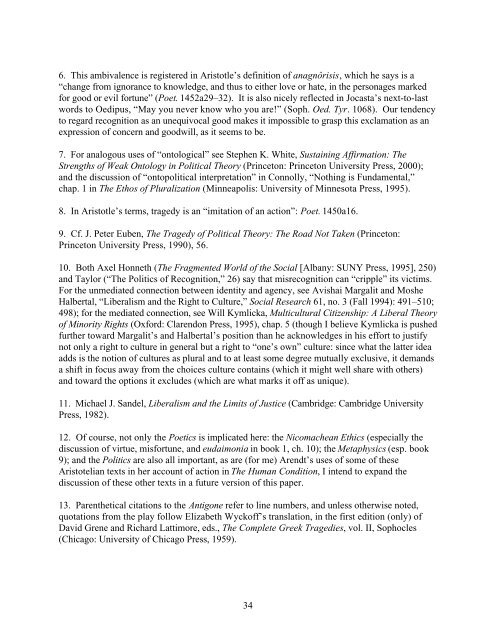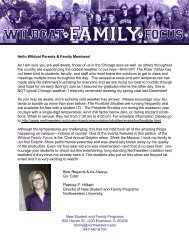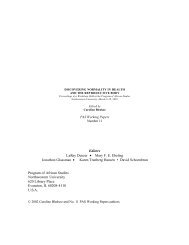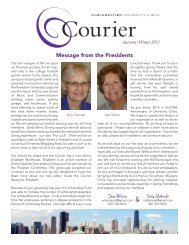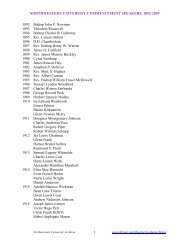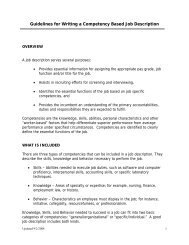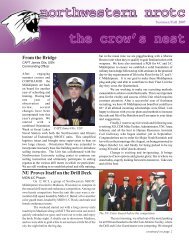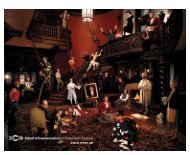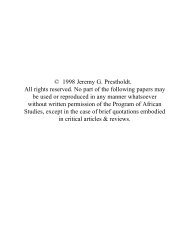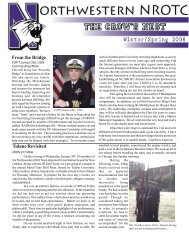TRAGIC RECOGNITION: ACTION AND IDENTITY IN ANTIGONE ...
TRAGIC RECOGNITION: ACTION AND IDENTITY IN ANTIGONE ...
TRAGIC RECOGNITION: ACTION AND IDENTITY IN ANTIGONE ...
Create successful ePaper yourself
Turn your PDF publications into a flip-book with our unique Google optimized e-Paper software.
6. This ambivalence is registered in Aristotle’s definition of anagnôrisis, which he says is a<br />
“change from ignorance to knowledge, and thus to either love or hate, in the personages marked<br />
for good or evil fortune” (Poet. 1452a29–32). It is also nicely reflected in Jocasta’s next-to-last<br />
words to Oedipus, “May you never know who you are!” (Soph. Oed. Tyr. 1068). Our tendency<br />
to regard recognition as an unequivocal good makes it impossible to grasp this exclamation as an<br />
expression of concern and goodwill, as it seems to be.<br />
7. For analogous uses of “ontological” see Stephen K. White, Sustaining Affirmation: The<br />
Strengths of Weak Ontology in Political Theory (Princeton: Princeton University Press, 2000);<br />
and the discussion of “ontopolitical interpretation” in Connolly, “Nothing is Fundamental,”<br />
chap. 1 in The Ethos of Pluralization (Minneapolis: University of Minnesota Press, 1995).<br />
8. In Aristotle’s terms, tragedy is an “imitation of an action”: Poet. 1450a16.<br />
9. Cf. J. Peter Euben, The Tragedy of Political Theory: The Road Not Taken (Princeton:<br />
Princeton University Press, 1990), 56.<br />
10. Both Axel Honneth (The Fragmented World of the Social [Albany: SUNY Press, 1995], 250)<br />
and Taylor (“The Politics of Recognition,” 26) say that misrecognition can “cripple” its victims.<br />
For the unmediated connection between identity and agency, see Avishai Margalit and Moshe<br />
Halbertal, “Liberalism and the Right to Culture,” Social Research 61, no. 3 (Fall 1994): 491–510;<br />
498); for the mediated connection, see Will Kymlicka, Multicultural Citizenship: A Liberal Theory<br />
of Minority Rights (Oxford: Clarendon Press, 1995), chap. 5 (though I believe Kymlicka is pushed<br />
further toward Margalit’s and Halbertal’s position than he acknowledges in his effort to justify<br />
not only a right to culture in general but a right to “one’s own” culture: since what the latter idea<br />
adds is the notion of cultures as plural and to at least some degree mutually exclusive, it demands<br />
a shift in focus away from the choices culture contains (which it might well share with others)<br />
and toward the options it excludes (which are what marks it off as unique).<br />
11. Michael J. Sandel, Liberalism and the Limits of Justice (Cambridge: Cambridge University<br />
Press, 1982).<br />
12. Of course, not only the Poetics is implicated here: the Nicomachean Ethics (especially the<br />
discussion of virtue, misfortune, and eudaimonia in book 1, ch. 10); the Metaphysics (esp. book<br />
9); and the Politics are also all important, as are (for me) Arendt’s uses of some of these<br />
Aristotelian texts in her account of action in The Human Condition, I intend to expand the<br />
discussion of these other texts in a future version of this paper.<br />
13. Parenthetical citations to the Antigone refer to line numbers, and unless otherwise noted,<br />
quotations from the play follow Elizabeth Wyckoff’s translation, in the first edition (only) of<br />
David Grene and Richard Lattimore, eds., The Complete Greek Tragedies, vol. II, Sophocles<br />
(Chicago: University of Chicago Press, 1959).<br />
34


